 W
WWelsh is a Brittonic language of the Celtic language family that is native to the Welsh people. Welsh is spoken natively in Wales, by some in England, and in Y Wladfa. Historically, it has also been known in English as "British", "Cambrian", "Cambric" and "Cymric".
 W
WWelsh-language literature has been produced continuously since the emergence of Welsh from Brythonic as a distinct language in around the 5th century AD. The earliest Welsh literature was poetry, which was extremely intricate in form from its earliest known examples, a tradition sustained today. Poetry was followed by the first British prose literature in the 11th century. Welsh-language literature has repeatedly played a major part in the self-assertion of Wales and its people. It continues to be held in the highest regard, as evidenced by the size and enthusiasm of the audiences attending the annual National Eisteddfod of Wales, probably the largest amateur arts festival in Europe, which crowns the literary prize winners in a dignified ceremony.
 W
WThe Welsh Courts Act 1942 is an Act of the Parliament of the United Kingdom that allowed the Welsh language to be used in courts in Wales and Monmouthshire provided that the person speaking would be under a disadvantage in having to speak English.
 W
WThe Welsh Language Act 1967, is an Act of the Parliament of the United Kingdom which gave some rights to use the Welsh language in legal proceedings in Wales and gave the relevant Minister the right to authorise the production of a Welsh version of any documents required or allowed by the Act.
 W
WThe Welsh Language Act 1993, is an Act of the Parliament of the United Kingdom, which put the Welsh language on an equal footing with the English language in Wales.
 W
WParts of the Bible have been translated into Welsh since at least the 15th century, but the most widely used translation of the Bible into Welsh for several centuries was the 1588 translation by William Morgan, Y Beibl cyssegr-lan sef Yr Hen Destament, a'r Newydd as revised in 1620. The Beibl Cymraeg Newydd was published in 1988 and revised in 2004. Beibl.net is a translation in colloquial Welsh which was completed in 2013.
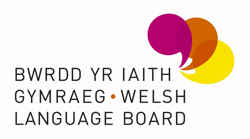 W
WThe Welsh Language Board was a statutory body set up by Her Majesty's Government under the Welsh Language Act 1993. It was an Assembly Sponsored Public Body. It began its life under John Walter Jones, and its last chief executive was Meirion Prys Jones, with Meri Huws acting as chair.
 W
WThe Books Council of Wales or Cyngor Llyfrau Cymru was established in 1961. Today it is funded by the Welsh Government. The council's aims are to promote the interests of Welsh language books and English language books of interest to Wales, to promote the publishing industry, and to assist and support authors by offering a number of services and distributing grants. It offers design and editorial services for publishers, distributes grants for authors and publishers, and provides services for libraries.
 W
WEducation delivered through the medium of the Welsh language is known as Welsh-medium education .
 W
WEglwys Dewi Sant is a Grade II listed church building in the centre of Cardiff, Wales. It is the only church in the Diocese of Llandaff to conduct its services exclusively in the Welsh language.
 W
WIn Welsh culture, an eisteddfod is a festival with several ranked competitions, including in poetry and music. The term eisteddfod, which is formed from two Welsh morphemes: eistedd, meaning 'sit', and fod, meaning 'be', means, according to Hywel Teifi Edwards, "sitting-together." Edwards further defines the earliest form of the eisteddfod as a competitive meeting between bards and minstrels, in which the winner was chosen by a noble or royal patron.
 W
WThe Honourable Society of Cymmrodorion, often called simply the Cymmrodorion, is a London-based Welsh learned society, with membership open to all. It was first established in 1751 as a social, cultural, literary and philanthropic institution. It fell into abeyance between 1787 and 1820, and again between 1843 and 1873. In its second and third incarnations its interests have been predominantly cultural and antiquarian. The present society claims continuity from that founded in 1751, although the three successive societies have in fact been slightly different in character and aims.
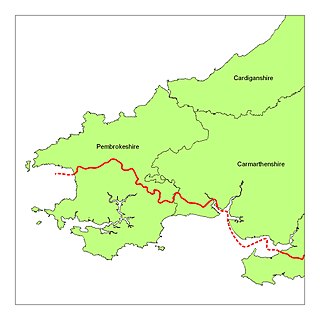 W
WThe Landsker Line is a term used for the language border in Wales between the largely Welsh-speaking and largely English-speaking areas in Pembrokeshire and Carmarthenshire. The English-speaking areas, south of the Landsker line and known as Little England beyond Wales, are notable for having been English linguistically and culturally for many centuries despite being far from the England–Wales border.
 W
WLittle England beyond Wales is a name applied to an area of southern Pembrokeshire and southwestern Carmarthenshire in Wales, which has been English in language and culture for many centuries despite its remoteness from England. Its origins may lie in the Irish, Norse, Norman, Flemish and Saxon settlement that took place in this area more than in other areas of southwest Wales. Its northern boundary is known as the Landsker Line.
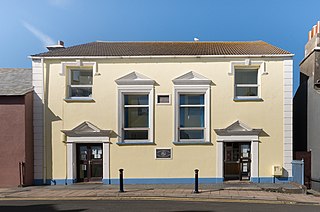 W
WMerched y Wawr is a voluntary, non-political, organisation for women in Wales. It is similar to the Women's Institute (WI) but its activities are conducted through the medium of Welsh. Its aims are to promote women's issues and to support culture, education and the arts in Wales.
 W
WNant Gwrtheyrn is a Welsh Language and Heritage Centre, located near the village of Llithfaen on the northern coast of the Llŷn Peninsula, Gwynedd, in northwest Wales.
 W
WThe National Assembly for Wales Act 2012 was an Act of the National Assembly for Wales that was given royal assent on 12 November 2012. It is significant in that it is the first Act passed in Wales to become law in over 600 years.
 W
WThe Welsh Not was a token used by teachers at some schools in Wales in the 19th century to discourage children from speaking Welsh at school, by marking out those who were heard speaking the language. Accounts suggest that its form and the nature of its use could vary from place to place, but the most common form was a piece of wood suspended on a string that was put around the child's neck. Other terms used historically include Welsh knot, Welsh note, Welsh lump, Welsh stick, cwstom, Welsh Mark, and Welsh Ticket.
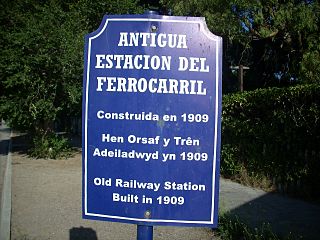 W
WPatagonian Welsh is a variety of the Welsh language spoken in Y Wladfa, the Welsh settlement in Patagonia, Chubut Province, Argentina. The decimal numeral system used in Modern Welsh originated in Patagonia in the 1870s, and was subsequently adopted in Wales in the 1940s as a simpler counterpart to the traditional vigesimal system, which still survives in Wales.
 W
WRoad signs in Wales follow the same design principles as those in other parts of the United Kingdom. All modern signs feature both Welsh- and English-language wording, with the Welsh first in many areas.
 W
WS4C is a Welsh-language free-to-air television channel. The first television channel to be aimed specifically at a Welsh-speaking audience, S4C is the fourth-oldest terrestrial television channel in Wales after BBC One, ITV and BBC Two. As of 2019–20, S4C had an average of 101 employees. It launched on 1 November 1982, with Channel 4 following on the next day.
 W
WThe Church of St Benet Paul's Wharf is a Welsh Anglican church in the City of London. Since 1556, it has also been the official church of the College of Arms in which many officers of arms have been buried. In 1666 it was destroyed in the Great Fire of London, after which it was rebuilt and merged with nearby St Peter's. The current church was designed by Sir Christopher Wren. It is one of only four churches in the City of London to escape damage during World War II.
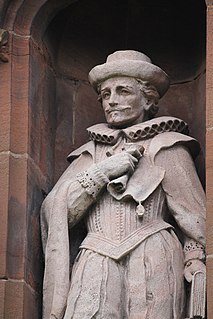 W
WWilliam Salesbury also Salusbury was the leading Welsh scholar of the Renaissance and the principal translator of the 1567 Welsh New Testament.
 W
WThe Welsh Language Society is a direct action pressure group in Wales campaigning for the right of Welsh people to use the Welsh language in every aspect of their lives. The current Chair of Cymdeithas yr Iaith Gymraeg is Mabli Siriol.
 W
WTafod y Ddraig, or Tafod, is a monthly Welsh language magazine dedicated to the promotion and preservation of the Welsh language. This magazine was the only voice of Cymdeithas yr Iaith Gymraeg from its foundation in October 1963 by Owain Owain. It is still published by the Society under the title Tafod ("Tongue"), approximately quarterly to coincide with events such as the National Eisteddfod.
 W
WThe Tafwyl festival is an annual Welsh-language festival which takes place in Cardiff, Wales. It culminates with a two day open air festival, normally held in Cardiff Castle.
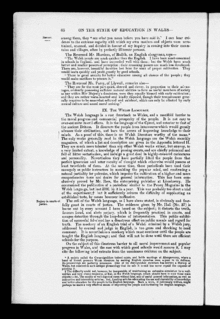 W
WThe Treachery of the Blue Books or sometimes the Treason of the Blue Books or just the "Blue Books" are the three-part Reports of the Commissioners of Inquiry into the State of Education in Wales... published by the British Government in 1847, which caused uproar in Wales for disparaging the Welsh; being particularly scathing in its view of the nonconformity, the Welsh language and the morality of the Welsh people in general. The Welsh sobriquet Brad y Llyfrau Gleision was from the name of a play satirising the reports, and those who gave evidence to the inquiry, which was published seven years after the reports. The Welsh Academy Encyclopaedia of Wales says that the name "took hold of the public imagination to such an extent that ever since the report has been known by that name".
 W
WMiddle Welsh V Ỽ is a letter employed in Middle Welsh texts between the 13th and 14th centuries. It represented the sounds of v, u, and w and – prior to inclusion in the Latin Extended Additional block of Unicode characters – was typically represented by the letter w in transcriptions. The Unicode code point for the capital letter is U+1EFC; that for the lower-case letter is U+1EFD.
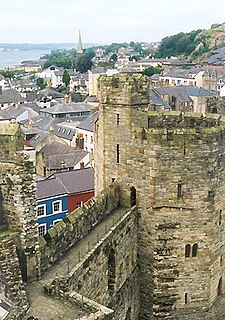 W
WThe place-names of Wales derive in most cases from the Welsh language, but have also been influenced by linguistic contact with the Romans, Anglo-Saxons, Vikings, Anglo-Normans and modern English. Toponymy in Wales reveals significant features of the country's history and geography, as well as the development of the Welsh language. Its study is promoted by the Welsh Place-Name Society.
 W
WY Fro Gymraeg is a name often used to refer to the linguistic area in Wales where the Welsh language is used by the majority or a large part of the population; it is the heartland of the Welsh language and comparable in that respect to the Gàidhealtachd of Scotland and Gaeltacht of Ireland. However, unlike its equivalent in Ireland, Y Fro Gymraeg does not have official government recognition.